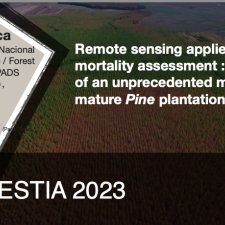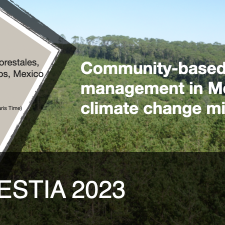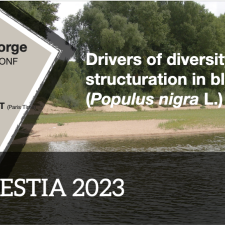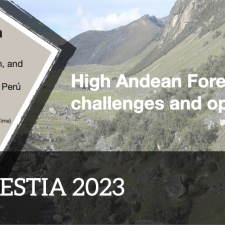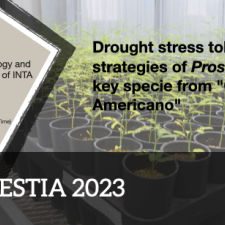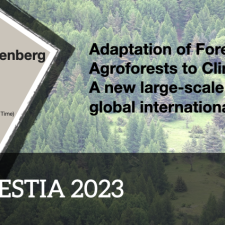Notice
#4 How vulnerable are the high mountain forests of Mexico to climate change ?
- document 1 document 2 document 3
- niveau 1 niveau 2 niveau 3
Descriptif
Abstract
The rapid change in the chemical composition of the atmosphere in the last century, especially in the CO2 concentration, has had important consequences on the energy balance of the planet, with direct impacts on the processes of the biosphere, lithosphere, and hydrosphere. Collectively, the imbalances in energy fluxes are the driving agent for what we know as climate change. Scientific literature show that the global climate is being increasingly more erratic, modifying the functionality of many ecosystems. Forests around the world are experiencing changes in their productivity, structure, composition, resistance, and resilience. Some high and middle elevation forests in Mexico growing between 3200 and 4000 m and represented by Pine (Pinus hartwegii Lindl.) and fir (Abies religiosa Kunth Schltdl. et Cham.) are also showing some impacts related to climate change. One important question to address is How vulnerable are these forests to climate change? The answer is not easy, however, combining results from some independent past studies we have made with students and colleagues, we can provide some insights about the vulnerability of these forests, considering the following axes: (1) Vulnerability related to soil depth and water and nutrients supply; available soil P reserves will become critical in these volcanic soils; (2) Vulnerability related to nutrient circulation; nutrient circulation and exports due to tree removal are important, (3) Vulnerability due to variations in water use efficiency; although plants could benefit from the CO2 increases, saving water not necessarily results in higher tree growth; and (4) Vulnerability due to other external disturbances such as pests and forest fires; the time for tree growth recovery is getting longer as climate change progress. Discussing the vulnerability of the forests according to these four axes can give us some insights about the forest functioning and the effects of climate change. In the last part of this talk I will comment on the urgency of taking actions to protect forests from the threats of climate change, involving the communities who live in the forest and who are the owners of these lands.
Intervention / Responsable scientifique
Thème
Dans la même collection
-
#7 Remote sensing applied to forest mortality assessment : the case study of an unprecedented morta…
GaticaGabrielSEMINAR # 7 « Remote sensing applied to forest mortality assessment : the case study of an unprecedented mortality event in mature Pine plantations in Argentina » Dr. Gabriel Gativa CIGEOBIO
-
Webinaire international – Laboratoire International Associé FORESTIA
RozenbergPhilippePortéAnnabelJesúsVargas-HernándezGuillerminaDalla-SaldaFernandezMaria-ElenaMarcucci PoltriSusana NoemiDuplex France-Argentine à l’occasion du 5ème anniversaire du Laboratoire international associé FORESTIA
-
#6 Community-based forest management in Mexico and climate change mitigation
Angeles-PérezGregorioSEMINAR # 6 : "Community-based forest management in Mexico and climate change mitigation " Gregorio Ángeles-Pérez (Colegio de Postgraduados, Mexico)
-
#5 Drivers of diversity structuration in black poplar (Populus nigra L.)
JorgeVéroniqueSEMINAR #5 "Drivers of diversity structuration in black poplar (Populus nigra L.)" Dr Véronique Jorge, UMR BIOFORA, INRAE/ONF, Orléans September 8th, 3pm CET (Paris Time)
-
#3 High Andean Forests: challenges and opportunities
Boza EspinozaTatianaSEMINAR # 3 « High Andean Forests: challenges and opportunities » Tatiana Boza Espinoza Institute for Nature, Earth, and Energy (INTE), Pontificia Universidad Católica del Perú May 19th,
-
#2 Drought stress tolerance strategies of Prosopis alba, a key specie from "Gran Chaco Americano"
DiegoLopez LauensteinSEMINAR # 2 : Drought stress tolerance strategies of Prosopis alba, a key specie from "Gran Chaco Americano", Diego López Lauenstein, Institute of Plant Physiology and Plant Genetic Resources of INTA
-
#1 Adaptation of Forests and Agroforests to Climate Change: A new large-scale, long-term, global in…
RozenbergPhilippeSEMINAR # 1 : "Adaptation of Forests and Agroforests to Climate Change: A new large-scale, long-term, global international initiative" Philippe Rozenberg (INRAE Val de Loire, Orléans, France)


